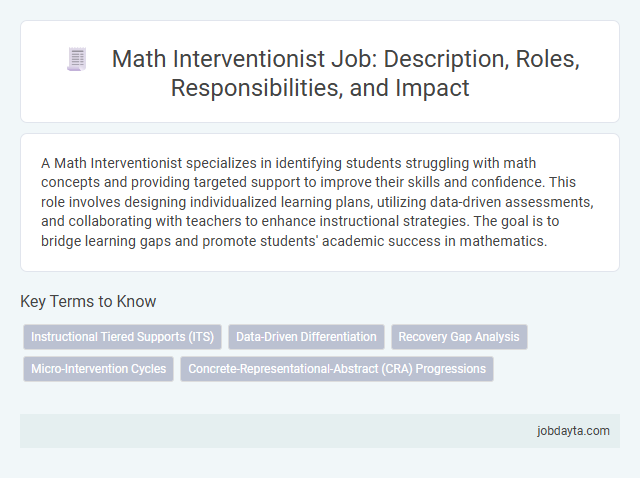A Math Interventionist specializes in identifying students struggling with math concepts and providing targeted support to improve their skills and confidence. This role involves designing individualized learning plans, utilizing data-driven assessments, and collaborating with teachers to enhance instructional strategies. The goal is to bridge learning gaps and promote students' academic success in mathematics.
Overview of a Math Interventionist Role
A Math Interventionist specializes in providing targeted support to students struggling with mathematical concepts. Their primary goal is to identify learning gaps and implement effective strategies to improve math skills.
You work closely with classroom teachers to develop individualized plans and deliver focused instruction. Progress is continuously monitored to ensure students build confidence and mastery in mathematics.
Key Responsibilities of a Math Interventionist
A Math Interventionist plays a critical role in supporting students who struggle with mathematical concepts, ensuring targeted instruction tailored to individual needs. Their work improves student confidence and enhances overall math proficiency through strategic interventions.
- Assess student math skills - Conduct diagnostic assessments to identify learning gaps and specific areas requiring intervention.
- Develop individualized intervention plans - Create customized lesson plans focused on students' unique challenges and learning styles.
- Collaborate with teachers and staff - Work closely with educators to integrate interventions into the general curriculum and monitor progress effectively.
Essential Skills and Qualifications
A Math Interventionist specializes in identifying and addressing gaps in students' mathematical understanding to boost academic performance. Essential skills include strong analytical abilities, effective communication, and proficiency in evidence-based instructional strategies. Your qualification should include a background in mathematics education, experience with intervention programs, and certification in teaching or specialized intervention techniques.
Daily Tasks and Workflow
A Math Interventionist provides targeted support to students struggling with mathematical concepts by identifying gaps in understanding. They implement personalized strategies to improve student performance and confidence in math.
Daily tasks include assessing student progress, creating individualized lesson plans, and collaborating with classroom teachers. Workflow involves analyzing assessment data, conducting small group or one-on-one sessions, and adjusting interventions based on student needs.
Collaboration with Teachers and Staff
Math Interventionists play a vital role in enhancing student achievement by collaborating closely with teachers and staff. They analyze student data to tailor instructional strategies that address individual learning needs. Your partnership with these specialists ensures a cohesive approach to improving mathematical understanding across the classroom.
Strategies for Effective Math Intervention
Math interventionists play a crucial role in supporting students who struggle with mathematical concepts. Implementing targeted strategies enhances student understanding and boosts confidence in math skills.
- Data-Driven Instruction - Using assessment data to tailor lessons helps address individual student needs effectively.
- Concrete Representations - Incorporating manipulatives and visual aids simplifies abstract math concepts for better comprehension.
- Frequent Progress Monitoring - Regularly tracking student progress ensures timely adjustments to intervention plans for improved outcomes.
Measuring Student Progress and Outcomes
| Role | Math Interventionist |
|---|---|
| Primary Focus | Measuring Student Progress and Outcomes in Mathematics |
| Key Responsibilities |
|
| Assessment Tools |
|
| Data Metrics |
|
| Impact on Student Outcomes |
|
Challenges Faced by Math Interventionists
What are the primary challenges faced by math interventionists in educational settings? Math interventionists often encounter difficulties addressing diverse student learning needs within limited time frames. Balancing curriculum standards while providing personalized support remains a significant challenge for these educators.
Impact of Math Intervention on Student Achievement
Math interventionists play a crucial role in improving student achievement by providing targeted support tailored to individual learning needs. Their expertise helps address gaps in understanding, promoting stronger mathematical reasoning and problem-solving skills.
Students receiving math intervention often demonstrate significant progress in standardized test scores and classroom performance. These specialists use data-driven strategies to identify areas of weakness and implement effective instructional methods. Your investment in math intervention services can result in lasting academic growth and increased confidence in math.
Career Growth and Professional Development Opportunities
Math Interventionists play a crucial role in improving student outcomes through targeted mathematical support and strategic teaching methods. Career growth for Math Interventionists includes opportunities to advance into leadership roles or specialize in curriculum development.
- Professional Certification - Earning certifications such as the National Board for Professional Teaching Standards enhances expertise and credibility.
- Continued Education - Pursuing advanced degrees or specialized training in math education expands instructional skills and career prospects.
- Leadership Opportunities - Experienced Math Interventionists can transition into roles like instructional coaches or curriculum coordinators.
Engagement in professional development workshops and conferences ensures Math Interventionists stay current with best practices and educational research.
Related Important Terms
Instructional Tiered Supports (ITS)
Math Interventionists play a critical role in implementing Instructional Tiered Supports (ITS) by delivering targeted, data-driven interventions tailored to students' specific mathematical needs. Their expertise in progressive, evidence-based strategies facilitates differentiated instruction within Response to Intervention (RTI) frameworks, enhancing student achievement across Tier 1, Tier 2, and Tier 3 support levels.
Data-Driven Differentiation
Math Interventionists utilize data-driven differentiation by analyzing student performance metrics to tailor instruction that meets individual learning needs and accelerates math proficiency. They employ formative assessments and progress monitoring tools to adjust intervention strategies, ensuring targeted support based on specific skill gaps and growth areas.
Recovery Gap Analysis
Math interventionists conduct recovery gap analysis by assessing students' proficiency levels to identify specific skill deficits hindering math achievement. Targeted interventions are then designed using diagnostic data to accelerate learning and close achievement gaps effectively.
Micro-Intervention Cycles
Math Interventionists implement micro-intervention cycles to provide targeted, data-driven support that addresses specific student learning gaps in mathematics. These short, focused cycles enable rapid assessment and immediate instructional adjustments, enhancing student mastery and accelerating progress in foundational math skills.
Concrete-Representational-Abstract (CRA) Progressions
Math interventionists implement Concrete-Representational-Abstract (CRA) progressions to enhance students' conceptual understanding by first using tangible objects, then visual representations, and finally abstract symbols. This evidence-based approach improves mathematical fluency and problem-solving skills for learners struggling with foundational math concepts.
Math Interventionist Infographic

 jobdayta.com
jobdayta.com